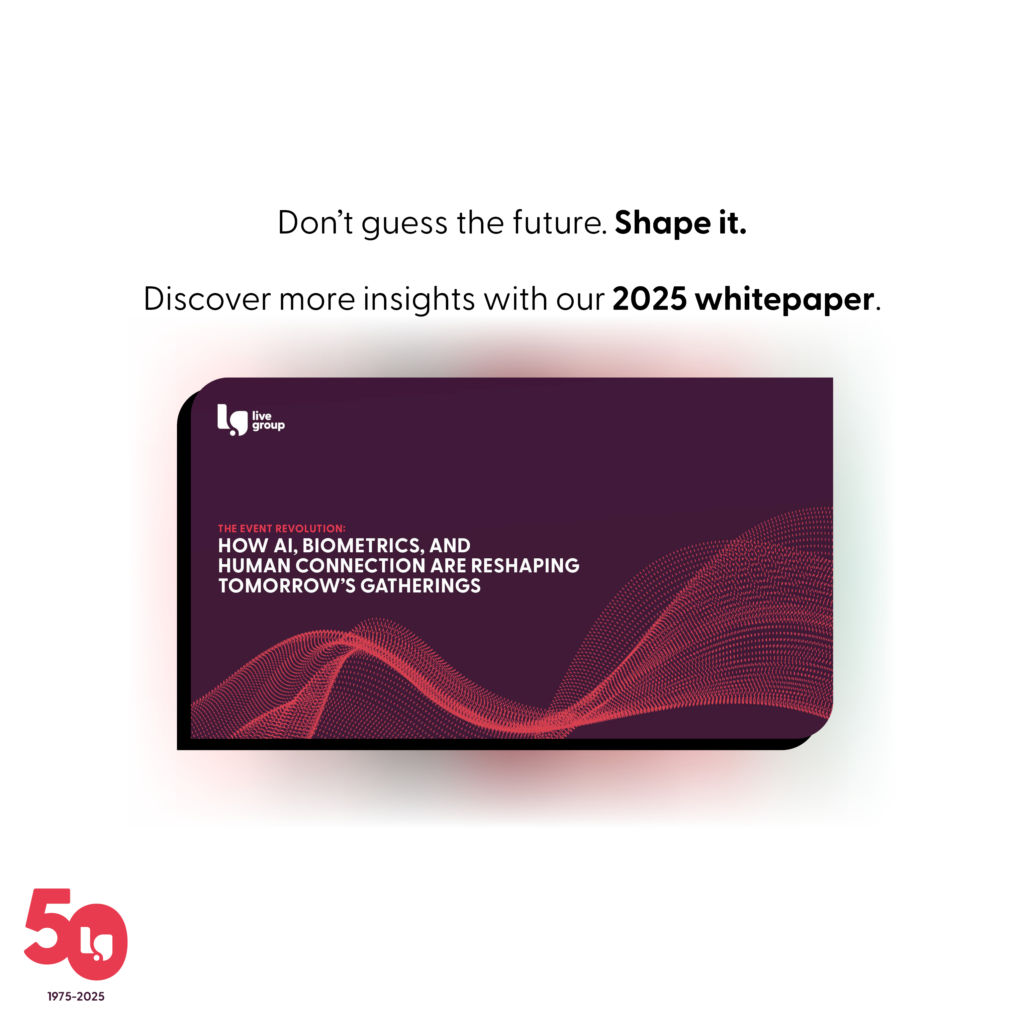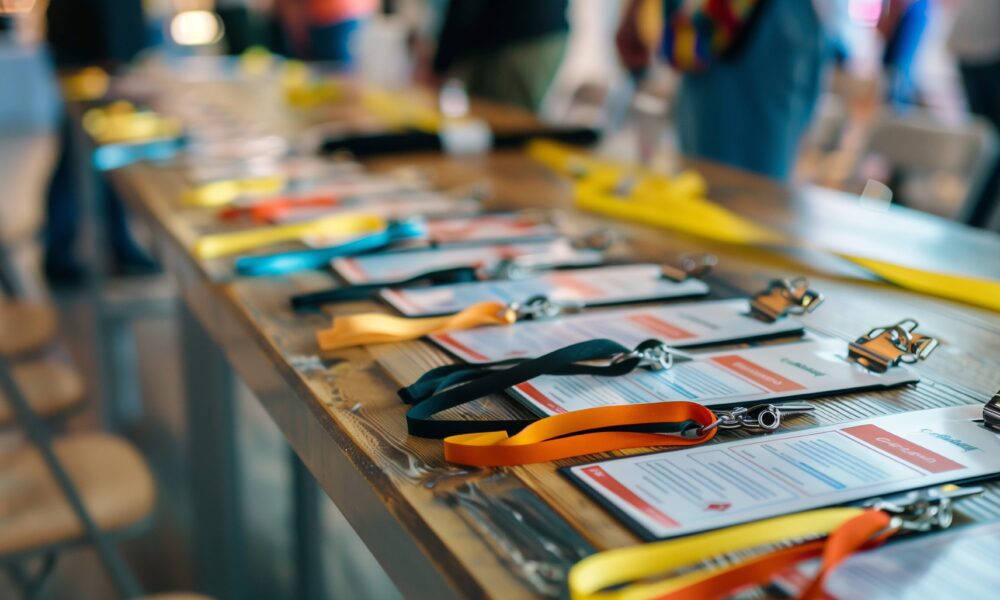Learn why a well-designed event registration journey sets the stage for everything that follows, giving your event the best chance of running smoothly from start to finish.
What is event registration?
You may be forgiven for thinking of event registration as just a box to tick – a form people fill in so you know who’s coming. While it’s true that it’s an important part of your data gathering process, event registration is also the very first touchpoint of your event journey. It’s where your attendees start forming opinions about your event offerings, your attention to detail, and, frankly, whether they’re excited to attend.
In 2025 and 2026, registration comes in many forms: offline on-site check-ins, online web forms, mobile apps, and hybrid combinations. An event registration tool can manage ticketing, collect attendee data, and even segment audiences for tailored communications. Good event registration practice is about understanding your audience and starting the relationship on the right note.
Think of it like this: if the registration is clunky, slow, or confusing, your event starts with friction. Attendees may be frustrated, unsure, or even question the event’s quality before it begins. Conversely, a smooth, branded, intuitive registration process can set a tone of professionalism and excitement, creating anticipation from day one.
Summary: Registration is the handshake before the conversation begins, and it shapes everything that follows.
Why is event registration so important?
Event registration matters because it’s your first impression — in simple terms. And first impressions stick. When someone lands on your registration page, they’re making snap judgments about your event: is it professional, organised, fun, or innovative? This is even more critical for high-value corporate, government, and professional events where expectations are high.
Beyond impressions, registration provides operational insight. It’s where you capture essential data: attendee preferences, dietary requirements, session choices, and accessibility needs. With accurate information, you can plan seating, catering, and networking opportunities without last-minute panic.
In 2025 and beyond, event attendees expect frictionless, mobile-first experiences. That means registration should be fast, visually clear, accessible on any device, and fully GDPR-compliant. People expect instant confirmations, calendar integration, and even mobile tickets or QR codes for contactless entry. Ignore this, and you risk a poor experience before your event even begins.
Summary: A smooth registration is as much about sign up as it is about making your attendees feel welcome, understood, and excited.
How do you set up event registration properly?
Setting up registration isn’t complicated if you follow a few smart steps:
- Define your audience and event goals. Are you targeting executives, government professionals, or public attendees? Knowing your audience helps tailor the registration experience.
- Select the right event registration tool. Choose a platform that matches your audience size, data needs, and hybrid capabilities.
- Map your data needs. Decide what information you genuinely need, trim the nice-to-have fluff, and ensure GDPR compliance.
- Build clear, uncluttered forms. Avoid too many fields; simplicity boosts completion rates.
- Set up confirmation workflows. Send instant email confirmations, reminders, and calendar invites. If relevant, add branded pre-event content to build excitement.
Don’t forget hybrid events: your registration setup should allow virtual attendees to join seamlessly. Integrating tools like Zoom, Hopin, or Teams ensures that no one feels left out, whether online or in-person.
Summary: A well-planned setup is like setting the stage before the curtain goes up: invisible, but essential.

How do you do online registration for an event?
Online registration is now the standard. No one wants to print forms or fax details anymore – convenience is king. Modern online registration tools let you manage ticketing, payments, session choices, and more, all in one place.
Here’s what matters for event registration in 2025–2026:
- Brand consistency: Your registration page should reflect your event branding; colours, logos, and tone. It’s part of the attendee experience.
- Payment options: Support multiple gateways and currencies if needed. Hybrid events often require flexible ticketing for in-person and virtual attendees.
- Mobile optimisation: Attendees will register on phones or tablets; make it seamless.
- Data capture: Collect essential information like dietary requirements, job roles, and accessibility needs, but keep it concise.
Remember, your registration page is part of the storytelling. A clear, engaging page communicates professionalism and builds anticipation.
Summary: Online registration is the backbone of successful modern events.
How do you set up an event registration link?
You want your registration to be accessible everywhere. That means links and QR codes. Here’s how:
- Registration links: Most event platforms have the capability to create a branded link for your event. Use custom URLs (e.g., livegroup.co.uk/eventname).
- How to create a QR code for event registration: Create a QR code for quick access. Adobe offer free tools which work well. Place codes on emails, invitations, posters, or even event merchandise.
- Security: Avoid insecure shorteners for sensitive data. Ensure links are HTTPS and QR codes point to verified platforms.
These small touches make your event feel modern and frictionless. Scanning a QR code or clicking a well-branded link should be intuitive and quick.
Summary: Links and QR codes are your open doors. Keep them simple, secure, and on-brand.

How can you increase event registration numbers?
So you’ve set up registration, but how do you fill those seats? Consider these strategies:
- Early bird incentives: Reward those who register first with perks or discounts.
- Social proof: Show logos of partner brands, highlight testimonials, or feature attendee numbers.
- Email nurturing: Personalised emails with reminders and updates keep potential attendees engaged.
- Retargeting campaigns: LinkedIn, Google, and Meta ads can gently nudge undecided prospects.
- Ambassador programmes: Encourage employees, sponsors, or influencers to promote your event.
- Countdown reminders: People respond to urgency — a friendly “only 3 days left” can boost registrations.
The secret to driving event registrations is about making the process appealing and frictionless, while subtly reminding attendees why they can’t miss out.
Summary: Driving registrations is about making it easy and compelling to say “yes.”
What are the best event registration platforms for 2025–2026?
Choosing the right platform is critical. Here are three standout options:
- Envoku (Live Group): Known for personalisation and audience profiling, perfect for corporate and hybrid events of all sizes. Integrated attendee insights let you tailor communications and experiences.
- Cvent: Enterprise-grade solution with robust integrations, detailed reporting, and strong support, great for large-scale conferences.
- Bizzabo: Offers a sleek, intuitive UX with hybrid capabilities, analytics, and networking features built in.
Bonus options for public events include Eventbrite, which is simple and familiar for attendees.
When selecting a platform, focus on: integration needs, hybrid capabilities, budget, and compliance. The right tool saves headaches later.
Summary: The right tool about fit, flexibility, and future-proofing.
Event Registration Closing thoughts
Registration is the strategic front door to your event. It sets expectations, communicates professionalism, and builds anticipation. Done right, it enhances every aspect of the attendee experience, from first click to final session.
In 2025–2026, with mobile-first, hybrid, and personalised experiences becoming standard, investing in smart registration processes and platforms is essential. Tools like Envoku, Cvent, and Bizzabo provide the flexibility, insight, and efficiency you need to create smooth, memorable events.
Remember: your event starts long before your attendees walk through the door. Make that first step count.
For most corporate or government events, aim to set up your online event registration six to twelve weeks in advance. For larger conferences or exhibitions, three to six months gives you enough time to run targeted campaigns, track sign-ups, and manage operational details. The earlier you open, the more opportunities you have to use tactics like early bird pricing and retargeting to increase event registration numbers.
Event registration is the process where attendees officially sign up to attend. It usually involves collecting key details (like name, email, role, dietary requirements) through an event registration tool or platform, and can include payment, session selection, and communication preferences. In 2025–2026, most organisers use online event registration software to streamline this process and personalise the attendee journey from the very first click.
If you’re wondering how to set up online registration for an event, start by choosing a reliable event platform that supports mobile, hybrid, and GDPR-compliant workflows. Create a clear, branded registration form that collects only the essential information, integrate your payment gateway (if applicable), and test the process on multiple devices. Don’t forget to set up automated confirmation emails and calendar invites to give attendees a seamless experience from the start. Full-service event companies like Live Group can set this up for you, creating a fully branded registration site that matches your event identity and handles the technical details behind the scenes. Platforms such as Envoku, Cvent, and Bizzabo make the setup far easier than starting from scratch, especially when paired with expert support.
Most modern event registration software will generate a registration link for you automatically. If you want to make it more memorable, use a branded URL (for example, envoku.livegroup.co.uk/eventname) or a shortened but secure version with HTTPS. This is especially helpful if you’re sharing links on printed materials, social posts, or email campaigns.
Knowing how to create a QR code for event registration is essential in 2025–2026, especially for mobile-first audiences. Simply take your event’s registration link and run it through a free QR code generator such as QR Code Monkey or Canva. Make sure the QR code leads directly to your online event registration page, not a generic homepage. Test it on different devices to avoid broken links on-site.
The answer is straightforward: focus on simplicity, security, and branding. Use a mobile-optimised event registration tool, limit unnecessary fields, ensure GDPR compliance, and make sure your page matches the look and feel of your wider event. A professional registration flow sets the tone for the rest of the attendee journey.
Ready to take the stress out of event planning?
Chat to us today about how our delegate management services can help bring your next event to life – on time, on budget, and beyond expectations. Whether you need full-scale delivery or targeted support, Live Group is here to help.
Download our latest report to explore the latest event solutions, learn how event production agencies are leveraging technology for seamless conference planning, and uncover strategies to enhance hybrid event management.






